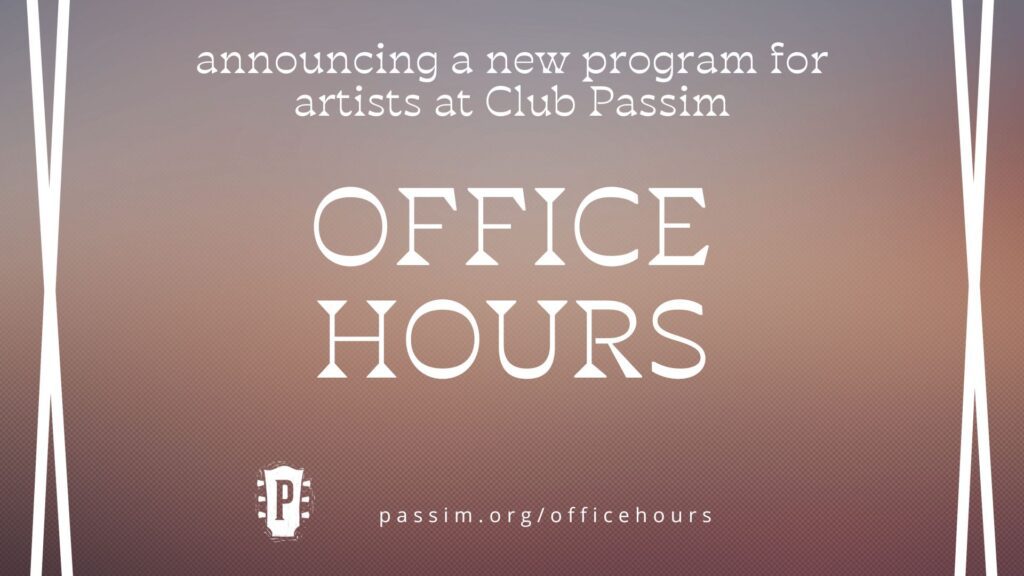
Office Hours is a new program that offers artists the chance to come into the club during the day to test out equipment with one of our sound engineers. More than just rehearsal space, we want to be your resource for testing new gear, playing around with new stage setups, or simply getting more comfortable on stage. This was inspired by the time Tall Heights got a new mic and asked us if they could practice with it in the club before their upcoming Sinclair show. The idea is to give you low-stress, playground time with good equipment and a friendly engineer.
Any questions? Email club manager Abby Altman at abby@passim.org.
FAQ:
- Who is this for?
-
- It’s for all levels of performing artists.
- What does it cost?
- We want this to be a resource for the community, so it is free to participate. If you would like to donate and have the means to do so, donations are greatly appreciated, and you can do so at passim.org/support. We will be pursuing sponsorships in the future to fund this time or to donate new gear for us to play with.
- How do I sign up?
- You can sign up at the link HERE in 30-minute increments. If you want more than 30 minutes at a time, simply sign up for multiple slots in a row. Keep in mind that these slots include your load-in and setup time, so if you have a lot of people or moving parts like drums, plan your time accordingly.
- What do I use the time for?
- This is your time to use however you like, and if you have any questions or specific requests, email me. Here are some suggestions of what you might like to do:
- Test out your new equipment before you use it in a real gig (pedals, mics, etc)
- Have a mock soundcheck so you get comfortable asking the sound engineer for adjustments to monitors, EQ, reverb, etc. Learn some more lingo to better communicate with your sound people.
- Test different vocal mics side-by-side to find what style of mic you like
- Does your group usually mic each instrument individually and you want to try a single-mic setup? Test out how far away your banjo needs to be to get a good balance.
- Practice with your group in a sound system as a dress rehearsal
- Record yourself playing a short set so you can watch your stage performance back and see how good your talking-and-tuning is
- Never been on stage before? Get familiar with the anatomy of a mic stand and how to adjust it for your height. Test out sitting or standing so when you play that open mic, you know if you want a stool.
- Are you going on the road with your own engineer and want to refine your soundcheck together? We have an analog board for you to practice with.
- This is your time to use however you like, and if you have any questions or specific requests, email me. Here are some suggestions of what you might like to do:
- What resources will be available?
- One of Passim’s sound engineers will be there to run sound, answer questions, explain different mics, or even give you a crash course in mixing. In terms of gear, here’s what we have to play with:
- soundboard is an Allen & Heath ZED428 with 4 monitor mixes
- an outboard effects unit
- Bass amp: SWR Workingman’s 160 head, Bergantino HT210 2×10 cabinet with adjustable tweeter
- Guitar amp: Ampeg Superjet Reissue SJ-12T, 1×12 speaker, with reverb and tremolo
- Keyboard: Kurzweil sp88x with weighted keys & sustain pedal
- 2 shure beta 87a mics
- Sm 57s (standard and beta)
- Sm 58s (standard and beta)
- 2 Samson C02 pencil mics
- 2 Ear Trumpet Labs edwina mics (large diaphragm condensers)
- Akg 414
- Audix D6
- One of Passim’s sound engineers will be there to run sound, answer questions, explain different mics, or even give you a crash course in mixing. In terms of gear, here’s what we have to play with:
